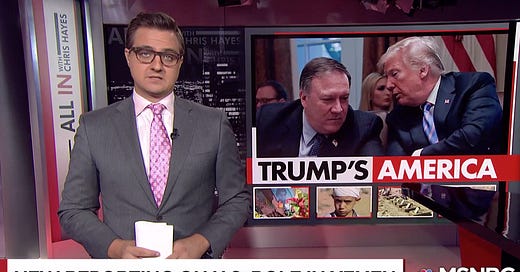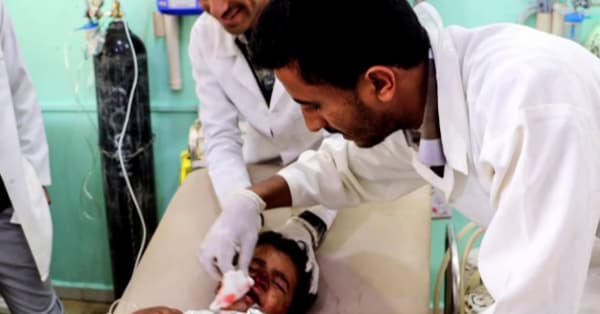With Democrat Back in White House, MSNBC Returns to Ignoring U.S.-Backed War in Yemen
Since Biden’s election win on Nov. 3, 2020, MSNBC hasn’t done a single segment on the world's worst humanitarian disaster.
A review of MSNBC’s coverage from Nov. 3, 2020 to Nov. 22, 2021 shows MSNBC hasn’t run a single segment on the U.S.-backed war still raging in Yemen.
To the extent MSNBC did cover Yemen’s “civil war” during this time frame it was exclusively to pass along, without skepticism, claims last spring from Democrats that President Biden had “ended U.S. support for the war”—which turned out to not be true in any meaningful sense, a fact evident at the time but not met with any questioning from MSNBC reporters or pundits.
Since then, it’s become increasingly clear little has changed in the status quo. While the U.S. has halted some forms of assistance, like mid-air refueling of aircraft, other forms of vital participation remain, including: green-lighting of weapons transfers, maintaining spare parts for Saudi war planes, sharing some forms of intelligence, and training the Royal Saudi Navy, which is enforcing a catastrophic blockade on Yemen.
And then there is the political cover that the Biden administration is giving the Saudi-led coalition, a vital form of support that noted in September by Annelle R. Sheline and Bruce Riedel at The Brookings Institute—hardly a far-left bastion of anti-imperial polemic:
Biden’s broken promise on Yemen
...Unfortunately, Biden’s approach is fatally flawed. The president stated that he would “end U.S. support for offensive operations in Yemen.” Yet the Saudi-led war on Yemen by definition, is an offensive operation. Saudi Arabia is bombing and blockading another country: Between March 2015 and July 2021, the Saudis conducted a minimum of 23,251 air raids, which killed or injured 18,616 civilians. The Houthis, known formally as Ansarallah, launch missiles in retaliation but if Saudi airstrikes ceased, the Houthis would have little reason to provoke their powerful neighbor. As long as the U.S. materially and rhetorically backs the Saudis’ war of choice, Biden’s assertion that the U.S. would end support for offensive operations is a lie.
The second crucial flaw in Biden’s approach is that he did not call for an immediate end to the Saudi blockade of Yemen. The blockade primarily blocks fuel from entering the Houthi-controlled Hodeida port; the Saudis also prevent the use of Sanaa International Airport. Blockades cannot be defensive: they are offensive operations, and therefore U.S. involvement should have ended following Biden’s declaration in February. The U.S. tacitly cooperated with the blockade by not challenging it, and the U.S. Navy occasionally announces it has intercepted smuggled weapons from Iran, suggesting a more active role than the administration admits. Congress should investigate.
Just this week, the Biden White House and State Department announced the US will be selling another $650 million in weapons to Saudi Arabia, hiding behind the nonsensical talking point that the weapons are “purely defensive.”
There was a time when MSNBC media personalities did act like they cared about what the UN calls the “world’s worst humanitarian disaster,” which has killed almost a quarter of a million people.
MSNBC ignored the war almost completely during the Obama years and early Trump years. But after the Saudi coalition bombed a school bus in August 2018, and Saudi dictator Mohammad bin Salman ordered the killing of Washington Post columnist Jamal Khashoggi in October 2018, they—like much of the U.S. media—finally began reporting on the regime’s human rights abuses. For a while.
MSNBC ran multiple segments on the war in the second half of 2018 when it was considered very much Trump’s war.
Aug 9 2018 - All in with Chris Hayes: Dozens of children killed in school bus bombing in Yemen
Aug 10 2018 - Velshi & Ruhle: An airstrike in Yemen struck a school bus, killing children
Oct 21 2018 - All in with Chris Hayes: 14 Million People On Brink Of Starvation In Yemen
Nov 15 2018 All in with Chris Hayes: Trump boosts authoritarians, as war rages in Yemen
Sept 2018 - All in with Chris Hayes: WSJ: Pompeo backed continuing US role in war in Yemen
Nov 28 2018 - All in with Chris Hayes: Senate advances bill to end support for war in Yemen
Dec 12 2018: All in with Chris Hayes: Rep. Chris Murphy on what's at stake with vote on Yemen
Dec 12 2018 - All in with Chris Hayes: Paul Ryan's Cowardly Act On Yemen
Dec 13 2018 - Andrea Mitchell Reports: Bernie Sanders: Congress must determine U.S. involvement in Yemen crisis
Dec 13 2018 - Ali Velshi: Senate votes to end U.S. support for Saudi-led war in Yemen
After this spasm of concern in late 2018, the coverage largely died out. As I noted in FAIR at the time, when activist pressure to pass a resolution compelling an end to U.S. support for the war was at its most urgent in March 2019, MSNBC ignored the effort altogether. There was a brief aside about Trump's veto of said Yemen war powers act by Rachel Maddow on April 16, 2019, but it amounted to little more than a passing mention.
The next—and it turns out last—time an actual segment aired on the Yemen war was on Morning Joe in July 2020. This report, by NBC News' Keir Simmons, did mention the war and the U.S.’s role in it, with a focus on how Covid was killing Yemenis. But since the July 2020 Morning Joe report, there have been no segments aired on MSNBC about the U.S.-backed Saudi bombing of Yemen.
In over 18 months, our nominally progressive cable network has not dedicated a single news report, roundtable debate, or segment to the world’s worst humanitarian disaster, which continues to be aided and armed by the U.S. government. When it was Trump’s war—and the Saudi regime fell out of favor with U.S. elites—their hearts bled. Now that we’re back to business as usual and the war is being armed and supported by a Democratic White House, it’s simply a non-issue.
In February 2021, President Joe Biden announced the U.S. was ending its support for “offensive” operations in Yemen, a deliberately vague and ultimately meaningless distinction that appears to have been designed to confuse progressives into declaring victory and moving on. Much to the White House’s liking, one can assume, the gambit seems to have worked, with MSNBC shelving the issue altogether and treating the U.S.-funded and backed war crime like it was wrapped up and out of our hands.
But it’s far from it. At any time, the Biden administration could cancel a U.S. program that provides maintenance for Saudi warplanes, the same warplanes that are still dropping bombs on civilians, including the recent bombing of a plastics factory in Sana’a. The Biden administration could reject the sale of U.S. air-to-air missiles, which can be used to shoot down airplanes and are one more tool the Saudi-led coalition can use to menace humanitarian workers who want to deliver supplies, or people trying to get their ill loved ones out of the country for treatment. And, it is an extremely low bar, but, at any point, Biden could clarify what is meant by support for “defensive” operations, and disclose the full extent of U.S. participation in the blockade, something he has repeatedly declined to do, even after 16 senators requested more transparency and robust action. These are all things the Biden administration is declining to do, thereby providing material and political support that is contributing to Saudi Arabia’s ability to continue the war.
After his six-month period in 2018 of breathlessly and repeatedly pronouncing the urgency of the issue, Chris Hayes’ show ‘All In’ has not run a segment on Yemen at all since December 2018.
Hayes hasn’t even mentioned the topic on Twitter since Biden took office Jan 20, 2021.
Mehdi Hasan, a consistent, long-time critic of Saudi Arabia and the war prior to joining MSNBC Feb 28 2021, did a segment on his online-only Peacock show after the election on Dec. 3 featuring prominent Yemen war critics Prof. Shireen Al-Adeimi and journalist Spencer Ackerman. In this segment, Hasan suggests in his opening that a Biden presidency would turn a page on the U.S.-Saudi relationship and end the war, neither of which happened (though both of his guests expressed profound skepticism). Also on his Peacock online-only show, he asked questions about continued U.S. support for Saudi Arabia, some quite skeptical, to guests Sen. Chris Murphy (D-Conn.) in April 2021 and Rep. Mark Pocan (D-Wisc.) in May 2021. But none of this was on his main cable show on MSNBC.
Hasan has not done a single segment on the Yemen war for his MSNBC show since his show first aired Feb 28 2021. On March 14 2021, he did ask White House Chief of Staff Ron Klain about the White House going soft on Saudi Arabia in general and in a one “minute rant” from May 2021, Hasan did take about 6 seconds to mention the U.S. selling arms to Saudi Arabia that are used in Yemen.

But this is the full extent of Hasan’s—and thus MSNBC’s—Yemen coverage. It goes without saying that multimillionaire MSNBC personalities Lawrence O’Donnell and Rachel Maddow haven’t done any segments on the war since Biden took office because, in the more than six years since it’s been raging, they haven’t mentioned it at all. To their credit, at least their indifference to the world’s largest humanitarian crisis isn’t motivated by partisan gotchas—they just don’t care in general.
In November 2020, Hasan insisted “we” needed to hold Biden to his promises that he would end US support for the war in Yemen.


Now that it’s been over a year since Biden’s election, and the U.S. is openly backing the Saudi blockade starving Yemenis, selling $650 million weapons to Saudi Arabia just this week, and continues to back SaudiArabia at the UN, perhaps media personalities with large platforms at nominally progressive cable networks should do just that.






Would it be possible to have you on a short program of my program, Parallax Views, to discuss your analysis of this?
Great article Adam